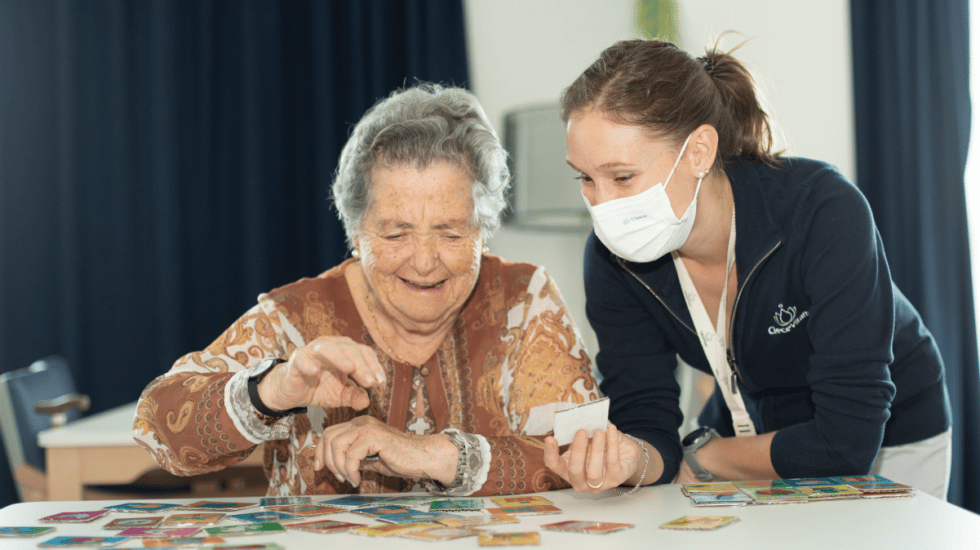

On October 1, on the occasion of the International Day of Older Persons, the UN reminded that by 2050 it is expected that the number of older people worldwide will exceed 1.500 million people, which is twice as much as today. In Spain, one of the countries where life expectancy exceeds 80 years, the population over 65 reached 20 percent of the total in 2021.
Now that we are living longer than ever, the challenge is to improve the quality of our years. Clece is one of the Spanish companies with the most experience in providing essential care to encourage active aging through services it operates in several Spanish municipalities for home assistance and telecare, as well as residences and day centres. They provide comprehensive care on a physical, cognitive, emotional and nutritional level thanks to the coordinated work of physiotherapists, doctors, nurses, psychologists, animators, social workers and support staff. The goal of his integrated person-centered care model is to improve the quality of life of users and residents.
psychological support
“A residential building is like an ecosystem: if one element fails, everything fails,” he explains. Mamen Girao, general medical psychologist at CleceVitam Carmen Conde in Cartagena. Your department is one of the key elements for everything to work properly. “We coordinate with the social work department the reception and initial assessment of residents, and also take care of their monitoring and development,” he says. In constant dialogue with specialists from other departments, a team of psychologists accompanies the resident and his family in the process of adaptation in the center.
“We help avoid behaviors that might be negative, but we also reinforce positive ones. For this you need listen and understand users, validate their emotions and respect their personality”. In this way, they managed to get many people to develop very positively in the new environment. “People who live alone for a long time or who declared themselves not very sociable at the initial interview create very beautiful and strong friendship networks here, sharing activities and experiences,” says CleceVitam psychologist.
Individual and individual treatment and the coordinated work of the various areas make it possible to detect the emergence of specific needs, but above all, contribute to a pleasant and safe environment. This is facilitated by the very amenities of this residence in Cartagena, opened in March of this year. “There are open areas and very spacious and bright rooms. The arrangement of rooms around common areas favors social relationships,” Girao says.
Physiotherapy to work on personal autonomy
The work of a physiotherapist also improves the quality of life of the residents of CleceVitam Carmen Conde. Norma Picchitt. The purpose of the warm-up, strengthening and strengthening exercises he offers for the joints is to maintain and develop mobility so that they maintain their personal autonomy. “Continuing to do basic things on their own, like walking, eating, bathing, or getting dressed may seem like a small thing to us, but it’s the most important thing for them,” he explains.
piccitto uses play and participation to increase the motivation of older people and engaging them in individual therapy sessions and group gymnastics. “I always hold events to get everyone involved. It’s a moment of joy and fun that builds camaraderie,” he says. During individual work with residents, adapted to the needs of each, the physiotherapist also stimulates their minds with tasks and questions.
Coordinated work of various areas allows you to identify the emergence of specific needs
“Assistants, psychologist and doctor spend much more time with them, and I use what they tell me to improve and personalize my work. It’s like a small family. Someone always notices something and shares it at the weekly meeting on Fridays. There is an exchange of information in all directions. Collaboration is the best leadershipconcludes Piccitto.
Importance of food
Nutrition is another fundamental aspect of a comprehensive residence care system. he notices it Lorraine Argent, nutritionist and food safety specialist at the CleceVitam residences in Cartagena and Castellón. She is responsible for the preparation of the menu that is served to users and oversees the careful evaluation of the nutritional value of each dish. The starting point is “a basic menu with no restrictions, about 2,000 calories, with all macronutrients,” he says. “Include plenty of fruits, vegetables, and legumes, as well as lean meats and fish almost every day. We avoid fatty and fried foods and cook with very little salt. A special menu is also designed for diabetics, patients with kidney disease and patients with other diseases.
In constant contact with the staff of the center, Clece nutrition managers try to adapt the menu to the tastes of users and the culinary traditions of the institution. And the fact is that food is much more than a necessity, it is a pleasure that is part of people’s lives, as well as a powerful element of memory and memories. In this sense, Clesé has recently had a pioneering experience with the Provincial Council of Valladolid, book Enjoying memories, which collects typical recipes provided by users of the Provincial Home Care Service. To do this, they worked alongside the assistants who provide the service and took note of their cooking instructions for each recipe. An activity that required memory training and concentration, which they now see with satisfaction, has turned into a book. Kleche extended his experience to other territories such as Andalusia, the Canary Islands, Catalonia or Extremadura.
Source: El Independiente